Of Charisms and Comfort Zones
Devra Torres | Apr 2, 2013 | 5 cmts
We all saw it coming.
On learning that Pope Francis rode the subway and cooked his own meals, we were charmed. When he preferred to skip cuff links and stoles,
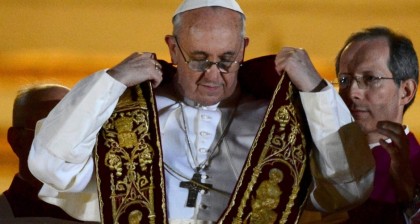
we were still delighted—or most of us were. When he stopped by his hotel to pay his bill, called up the local kiosk owner to cancel his paper, and held a mass for garbage collectors, everybody cheered.
Some have already been put off by one gesture or another, and more will surely follow suit as this (very wholesome) Papaphoria diminishes.
When it came out, for example, that he had asked his countrymen
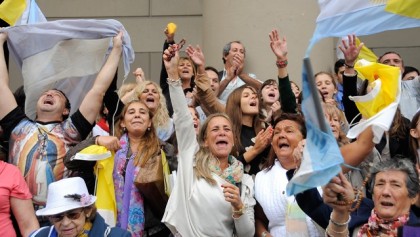
to stay home from his installation and give the money to the poor, not the airlines, that sounded noble. Even his immediate family took him at his word. He’s been known to miss family barbecues to minister to the needy, too.
Well, but wait a minute! Should we skip all family get-togethers and once-in-a-lifetime celebrations as long as we “have the poor with us”? Should we always refrain from spending money or time on anything not strictly necessary, to us or to someone in need?

I hope we’ll all resist the impulse to switch from charmed to dismissive the minute Pope Francis steps on our own favorite toes. I hope we’ll resist settling for an instinctive reaction in one direction or the other.

Some will be inclined to say: Well, that was refreshing up to a point, but let’s not get carried away. I respect his office but will feel free to ignore any suggestions that strike me as too liberal (or too conservative). If it’s outside my comfort zone, it can safely be ignored.
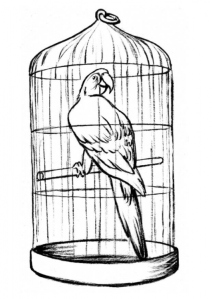
Others will go to the other extreme, assuming we ought to be mimicking his every action. From now on, they might assume, every good Catholic will eschew cufflinks, family barbecues, and pilgrimages: If it’s outside one’s comfort zone, it must be God’s will.
If nothing else, he’s shaping up to be the Pope Who Makes You Think Twice—the one who makes you say, maybe there’s more than I thought to Catholic social doctrine, or care for the environment, or belief in the devil, or identification with immigrants—whichever teaching you’re less accustomed to taking to heart.
We each have a charism, and we each have a comfort zone. But they can be tricky to identify, tricky to tell apart. Where to begin?
For what it’s worth, here’s an embarrassing true story that taught me everything I know about the subject.
Our family was once invited to dinner by our friend, “Elena.” She welcomed us in, remarking that she had personally sewed all the curtains, the cushions, the upholstery, everything. Her husband had made all the furniture and cabinetry. As she served us an elaborate, home-cooked meal, she updated us on her grown daughters, both elegant, successful, and faithful. Then, after dinner, she showed us an elaborate dollhouse she was working on in her spare time. It was far neater, cleaner, and more tastefully decorated than our own apartment.
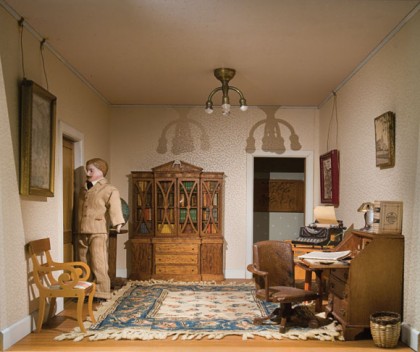
I thought about my own last sewing project: a foolproof, wraparound skirt I’d attempted in eighth grade. Not only had I burnt an iron-shaped splotch deep into the denim; I’d also outgrown it by the time I finally finished the hem.
When she got to the carpentry, I recalled a crookedly hinged, unevenly stained jewelry box I’d produced in shop class twenty years earlier.
Then she got to the daughters. I glanced at my own children. My son had a little blob of toothpaste stuck in his hair, and my daughter was carefully dipping her sleeves into Elena’s excellent sauce. It was hard to imagine them ever being presentable, much less as successful and competent as they’ve turned out.
On our way out, I took one last look at the lovely dollhouse, and life seemed very dismal.
That’s when I heard the words: “You don’t have to be Elena. You can be a better Devra.”
I don’t know if I can convey how life-changing that message was. It uncovered a silly assumption that had long been lurking in the back of my mind: that what God really wanted was for me to turn into somebody else altogether.
But it wasn’t a message of warm, fuzzy, relativistic affirmation. It was also a pointed challenge. I could think of plenty of concrete things I could do to with my talents, my inclinations, my temperament, personality and abilities which, for no good reason, I had left untried. I didn’t have to be an expert seamstress or maker of sauces. But I wasn’t off the hook, either.
What does this have to do with Pope Francis? Just this: we’re not all called to turn into him, or his namesake. We need not assume we’re supposed to renounce every pleasure, but we (we Americans, especially)) would probably do well to look into how many luxuries masquerading as necessities have snuck into our lives. Admiring simplicity and humility from afar, tossing off a glib “That’s not my personal charism” when doubt strikes is not sufficient.
When we stop frittering away our spiritual and mental energy in trying to turn into some wholly different (and much more impressive) person, we’ll be far more free to “become who we are.”
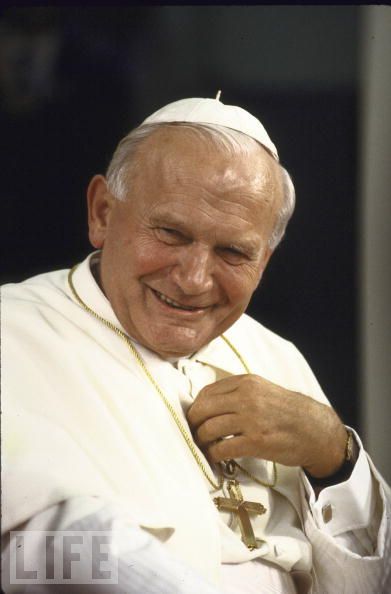
Still, a charism is not simply a comfort zone. There will be surprises. I’d bet even the good, honest, warmhearted, straight-talking, hard-working, self-effacing, 76-year-old man we now call Papa never expected that his charism would land him where he is today.
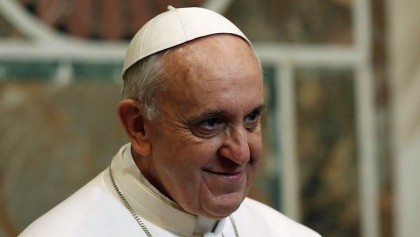

Comments (5)
Patrick Dunn
Apr 4, 2013 12:36pm
I appreciate these insights and need to keep them in mind, though I also want to share my fears. To borrow the wording of Fr. Ray Blake,
"If I have one prayer for the Papacy of Francis the First is that it has eye for the future, that Francis leaves the papacy fit for a Pope that is quite different to himself. Whether any future Pope wears the tiara or not, I don't care but what I really fear is that we will have a Papacy that is founded entirely on the personality of an individual, rather than the authority Christ has given it. I want a Papacy founded on rock not sand, that has substance in itself and is not dependant on the individual who fulfills the position for a brief few years."
Source
Katie van Schaijik
Apr 4, 2013 4:48pm
I've heard others express that fear, but I can't quite understand it.
To me, it is not his personality or his "personal charisma", but the genuine Franciscan charism of Pope Francis that impresses and attracts.
Benedict had his gentleness of spirit and his immense learning. John Paul had his energy and warmth and fearlessness.
I can't understand why Fr. Blake sees this differences as "lurchings" rather than changes that reveal fresh depths and riches. He says, "The office is important, not the office holder." But is this true in the case of Popes? I don't think so. The Pope isn't just an office holder, he's the Holy Father. Who thinks of his father as an office holder?
Patrick Dunn
Apr 5, 2013 8:34am
I think both are, or at least can be, important: the office and the office holder. But the office holder cannot become 'bigger' than the office. The role of the Pope should be decided by sound theology; a consistent refashioning of that role due to an individual Pope's preferences is problematic: Pope Benedict "tried to deliver it from being a feudal fiefdom based on the personal superstar qualities of an individual Pope to something dependant on Tradition."
A genuine charism is not one's personal charisma (which would mean that it's devolved into a cult of personality), though of course the personality of a person - and his or her own charisma - cannot be separated from how one lives one's charism (or office, if applicable). And, it can probably help (as I think was the case with John Paul II and, who knows, perhaps Pope Francis too.)
Though, as Fr. Blake also warns, "Woe to you when all men speak well of you for their fathers used to treat the false prophets in this way". Lk 6:26 I'd add the warning about putting our trust in princes.
Sam Roeble
Apr 5, 2013 3:56pm
Katie van Schaijik, Apr. 4 at 4:48pm
The Pope isn't just an office holder, he's the Holy Father. Who thinks of his father as an office holder?
If one did, it would be either Nietzchean or Freudian--that is, suspicious of one's father's power.
Unfortunately, Freud had--and continues to have--a monopoly on Oedipus Rex. But recently I learned that Karol Wojtyla translated it into polish in his day. This greatly redeems the play in my view. It no longer fits into Freuds' neurosis, but is redeemed.
Redeemed in the sense that Oedipus really was unconscious of his family situation, and repented as soon as he did know
(Excuse the tangent on Freud)
Devra Torres
Apr 5, 2013 4:23pm
There's lots more to think about here. In the context of one post, I couldn't get into the distinction between personal charisms and charisms of, say, the Franciscan order. I think the whole reaction to Pope Francis' original way of living the papacy is at least having the salutory effect of getting us to stop and ponder where the office ends and the office holder begins. It's also furthering the whole, very important project of helping people see how much room the Christian life allows for different personalities and styles--how many different ways there are to be faithful without crossing the line into unorthodoxy.